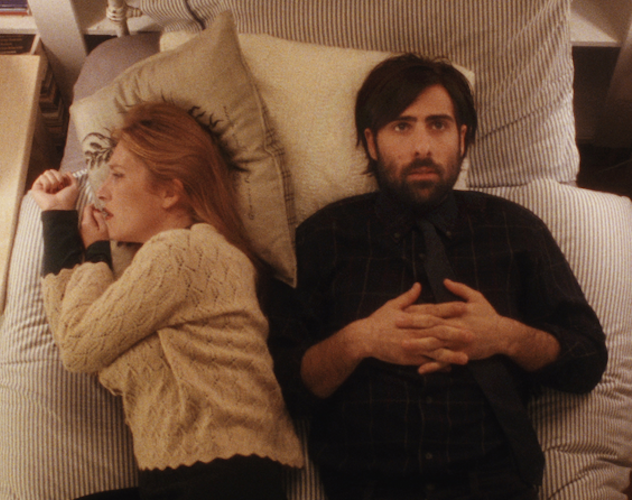Fuse Film Review: “Listen Up Philip” — Portrait of the Artist as Sheer Ego
Despite Philip’s self-absorbed claptrap, young, successful women seem to be drawn to him. Go figure.
Listen Up Philip, directed by Alex Ross Perry. Screening at the Museum of Fine Arts, through November 12.

Josephine de la Baume and Jason Schwartzman in the movie “Listen Up Philip.” Courtesy of Tibeca Film.
By Paul Dervis
Charlie Bubbles, a 1967 film about an emotionally attenuated novelist who suffers from writer’s block as well as the capacity to feel for those he cares for most, was written by the acclaimed playwright Shelagh Delaney and starred the powerful Albert Finney, also making his directorial debut. Although Charlie was certainly not a man your would want to emulate or allow your daughter to date, Finney and Delaney created a sympathetic character that you could not help but feel deeply for. Even in his most maniacal, overblown outbursts, such as the opening scene in a fancy London private club, Charlie dripped with pathos.
In the 1970 film of Henry Miller’s classic stream-of-consciousness novel Tropic of Cancer, Rip Torn, one of our most unheralded actors, was cast as Miller in Paris. Tackling the role of such a priapic author must have been a daunting task, but he does it with panache. The movie could have been simply a hedonistic bore, but it was anything but. Torn brought a lust for life to the wandering character that made the aimlessness of the piece awe inspiring.
These films are the spiritual forerunners to Alex Ross Perry’s Listen Up Philip. Unfortunately, this film contains none of the life of its models. After all is said and done, this film about a self-regarding writer wallows in self indulgence to the point of tedium. Perry, who both wrote and directed it, is clearly no match for Miller or Delaney. However his alter ego, Philip, certainly thinks he is.
Philip is a young New York novelist with his second book about to be published. He is only recently begun to establish a literary name for himself. Months earlier he was living off his girlfriend Ashley, an up-and-coming photographer. She seems to love him deeply; he treats her like garbage. This will be the dynamic for Philip regarding all his relationships for the next hour and a half on celluloid. The publisher of his second book has set up a multi-city book tour for Philip, but he refuses to go. He has decided that he is above all mundane publicizing. He also calculates that this refusal to appear in public will create more buzz about himself. Even though this decision hurts him financially.
A world-class writer named Ike Zimmerman (if you guessed Philip Roth you would be on the money) takes a liking to Philip and offers his country cottage as safe haven for up-and-coming novelist. Zimmerman hasn’t published anything in six years; he is now living off his respected body of work. The two men have much in common — particularly oversized egos. Zimmerman becomes the only character in the film Philip does not actively disrespect.
To help Philip pay his bills, Zimmerman gets the young novelist an instructor’s position at a small New England college, where he is given an opportunity to alienate students and colleagues alike.
Despite Philip’s self-absorbed claptrap, young, successful women seem to be drawn to him. Go figure. Philip has no romantic spark, and few redeeming human qualities. His dedication to total boorishness never wavers, and Jason Schwartzman, playing the title role, does nothing to mitigate the character’s indifference to others in order to give us a reason to care about him. In a scene close to the end, Philip confides to one of his many paramours why he is the way he is, but it is too little too late.
We are simply left with an empty feeling. Why would we give a damn?
The film’s subplot is much more compelling than the non-adventures of Philip. Jonathan Pryce, as Zimmerman, creates a multilayered portrait of a literary celebrity in decline, a man determined to project his fame against the ravages of time. He is self-concerned to a fault, caring more about his legacy than for his daughter, played with a cutting sadness by Krysten Ritter. This relationship is the one place in the film that generates dramatic substance. Zimmerman is pathetic and dangerous: his daughter is terminally damaged by his inability to give her even the smallest scraps of love. His cruelty to her is profound. In Pryce’s adroit performance we see the pain it causes him to be this way.
If only the film spent more time developing this complex relationship, rather than steeping us in the dead end narcissism of Philip.
If you are interested in this storyline, do yourself a favour and rent Charlie Bubbles.
Paul Dervis has been teaching drama in Canada at Algonquin College as well as the theatre conservatory Ottawa School of Speech & Drama for the past 15 years. Previously he ran theatre companies in Boston, New York, and Montreal. He has directed over 150 stage productions, receiving two dozen awards for his work. Paul has also directed six films, the most recent being 2011’s The Righteous Tithe.
Tagged: Alex Ross Perry, Jason Schwartzman, Listen Up Philip, Museum of Fine Arts Film
